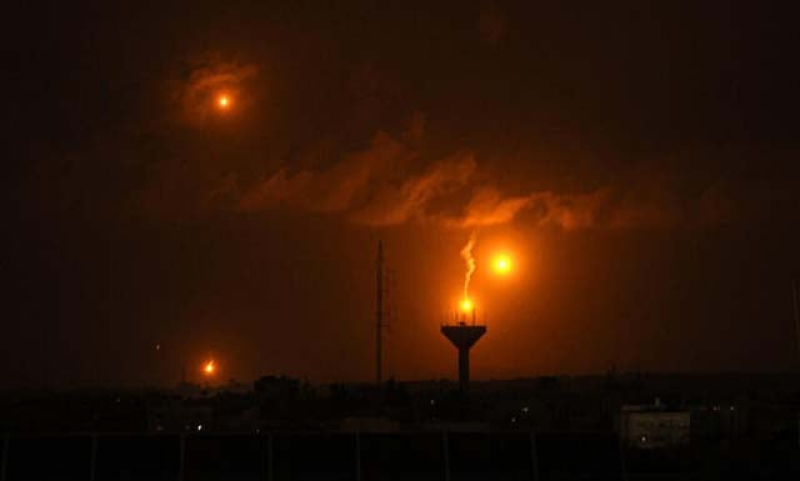- BNP senses ‘dangerous conspiracy’ against democratic transition |
- CEC Vows Credible Election to End Stigma |
- High-level meeting reviews country’s economic progress |
- Dhaka suspends visa, consular services at its Delhi, Agartala Missions |
- Govt to cut savings certificate profit rates from January |
Israel strikes key Gaza city as public mourns slain soldiers

(BSS/AFP) - Israel kept up its heavy assault on the "encircled" Gazan city of Khan Yunis following an outpouring of grief over the army's deadliest single day since ground operations in the territory began.
As the fighting raged, the UN humanitarian agency OCHA reported that Israeli forces on Tuesday had issued fresh evacuation orders for a section of Khan Yunis housing an estimated half a million residents and displaced people.
The orders came as the World Food Programme warned that Gazans were facing "catastrophic food insecurity", and as the UN chief took Israel to task over its rejection of a two-state solution -- seen by ally the United States as the only path to a durable peace.
Twenty-four Israeli troops were killed on Monday, 21 of them reservists slain "when a squad of terrorists surprised the force" with rocket-propelled grenade fire, military spokesman Daniel Hagari said Tuesday.
"The price of the war is heavy and painful," he added.
Mourners filed into funerals for the reservists on Tuesday, including some with no connection to the deceased.
Israela Oron, of the Ben-Gurion University of the Negev, said the mounting soldier deaths -- now at 221 -- would prompt the public to "demand clear answers about the purpose and the goal of this operation in Gaza".
Prime Minister Benjamin Netanyahu said an investigation had been launched into the "disaster".
- 'Nothing to eat or drink' -
On the ground, fighting raged in Khan Yunis, Gaza's main southern city, which the Israeli army said it had "encircled".
OCHA said in a bulletin that Israeli forces on Tuesday had issued evacuation orders for a four-square-kilometre (1.5-square-mile) segment of Khan Yunis currently home to around 513,000 people as well as the major Nasser and Al-Amal hospitals.
The office of Palestinian president Mahmud Abbas decried the "dangerous demands" for residents to head south, and warned that Israel intended to "displace the Palestinian people from their homeland, thus leading to unforeseeable consequences", according to official news agency Wafa.
The war in Gaza began with Hamas's unprecedented October 7 attacks, which resulted in the deaths of about 1,140 people in Israel, mostly civilians, according to an AFP tally based on Israeli official figures.
In response, Israel has carried out a relentless offensive that has killed at least 25,490 people in Gaza, around 70 percent of them women and children, according to the health ministry in the Hamas-run territory.
The war has led to dire shortages of food, water, fuel and medicines in the besieged territory.
In ruined Gaza City, displaced resident Umm Dahud al-Kafarna said the Israeli campaign had left "us with nothing to eat or drink while bombing us from the air, sea and tanks".
"My nieces suffered severe injuries," she added. "It's tragic... May they find some mercy in their hearts."
The World Food Programme warned Tuesday that conditions in Gaza were worsening.
"More than half a million people in Gaza are facing catastrophic food insecurity levels and the risk of famine increases each day," said Abeer Etefa, the WFP's senior Middle East spokeswoman.
UN Secretary-General Antonio Guterres, meanwhile, decried Israeli officials' repeated rejection of calls for the creation of a Palestinian state as "unacceptable" in a speech to the Security Council, saying it "would indefinitely prolong" the conflict.
- 'Sober, serious' talks -
The October 7 attacks also saw militants seize 250 hostages, and Israel says around 132 remain in Gaza. That number includes the bodies of at least 28 dead hostages, according to an AFP tally based on Israeli figures.
US President Joe Biden's Middle East envoy Brett McGurk was in the region for talks aimed at brokering a new deal to free the remaining captives in exchange for a pause in fighting.
"Certainly one of the things he's in the region talking about is the potential for another hostage deal, which would require a humanitarian pause of some length," National Security Council spokesman John Kirby said.
"The conversations are very sober and serious about trying to get another hostage deal."
A Palestinian source familiar with the talks told AFP a Hamas delegation had arrived in Cairo on Tuesday to meet Egypt's intelligence chief and discuss new ceasefire proposals.
- Strikes in Yemen, Iraq -
The Gaza war has spurred fears of a wider escalation, with a surge in violence involving Iran-backed Hamas allies across the region.
The United States early Wednesday targeted sites used by Iran-backed militants in Iraq, US Defense Secretary Lloyd Austin announced, with Iraqi sources saying two people were killed.
The strikes came just days after US troops in Iraq were targeted with ballistic missiles and rockets in an attack the Pentagon blamed on militants supported by Tehran.
Washington also carried out another strike early Wednesday against Yemen's Huthi rebels, targeting two "anti-ship missiles that were aimed into the Southern Red Sea and were prepared to launch", the US Central Command said.
The day before, the United States and Britain had launched another round of air strikes against the Iran-backed Huthis over their attacks on Red Sea shipping, which the group says it is carrying out in solidarity with Palestinians in Gaza.
Israel, meanwhile, continued to trade cross-border fire with Lebanon's Iran-backed Hezbollah movement on Tuesday.
Iranian President Ebrahim Raisi was expected to fly to Turkey Wednesday for twice-delayed talks aimed at ironing out differences and trying to halt the spread of the Israel-Hamas war.

